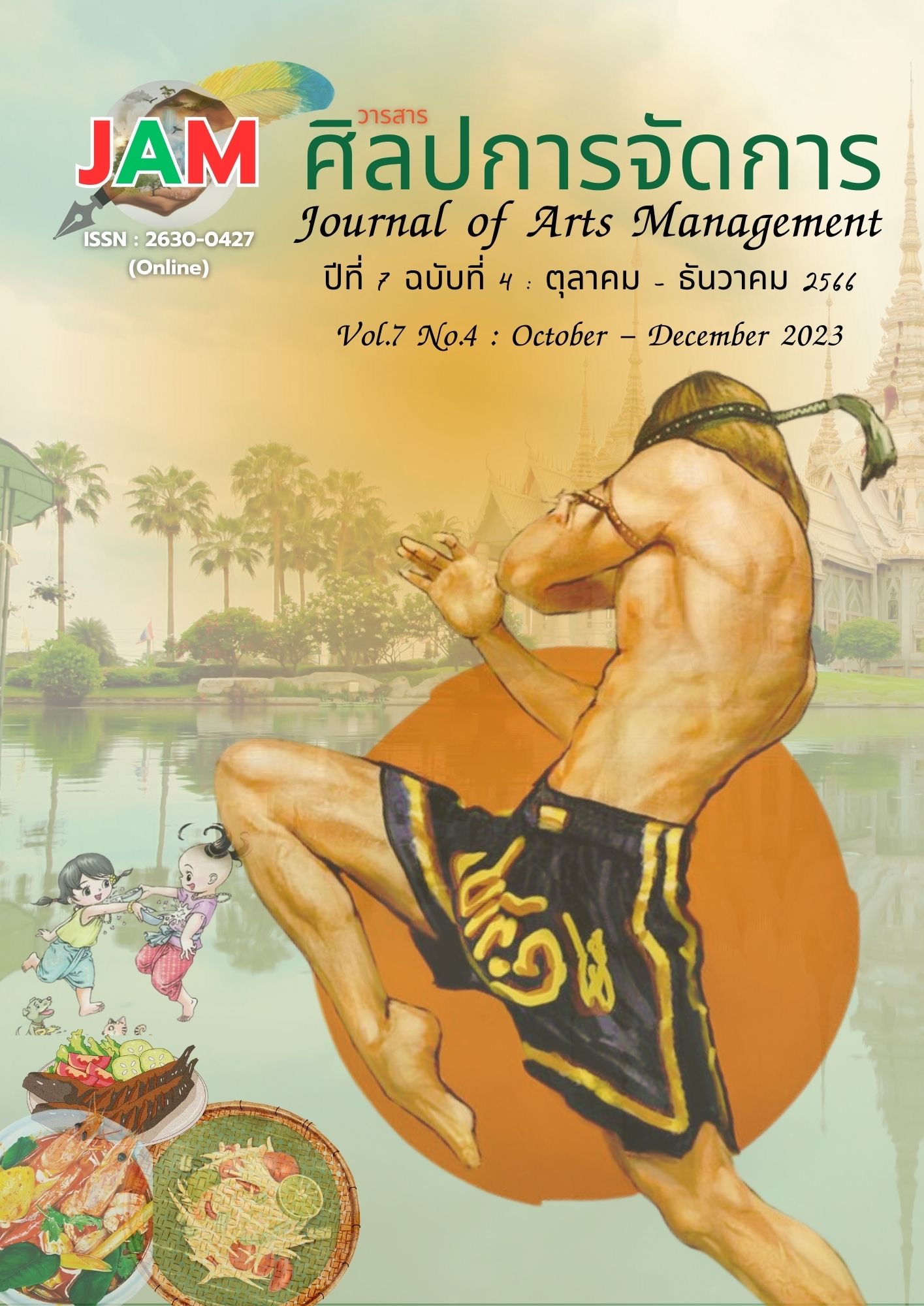The Instruction Model Based on Cooperative Learning and Game-Based Learning for Enhancing English Communication Abilities
Main Article Content
Abstract
The purposes of this research were as follows: 1) to study the current situation, problems, and needs of English language teaching and learning in order to promote English language communication. 2) to develop an instruction model based on cooperative game-based learning using board games and 3) and examine the effects of an instruction model based on cooperative game-based learning using board games approach on English language communication skills. The sample group used in this research consists of 30 students from Grade 11 at Ubolratana Rajakanya Ratchawittayalai Nakhonratchasima School during the second semester of the academic year 2022. They were selected by purposeful sampling. The research utilized teaching plans based on collaborative learning and game-based teaching approaches, board games as learning media, and assessments of speaking and listening abilities in English. The research findings indicate that an instruction model based on cooperative game-based learning using a boardgame teaching approach consists of three stages: 1) construction of knowledge; 2) socialization; and 3) evaluation. The approach comprises seven important components: 1) learning environment; 2) learners; 3) teachers; 4) communication; 5) content; 6) board game media; and 7) assessment. The evaluation results by experts show that the approach aligns with cooperative and game-based learning and is consistent with Grade 11 students. The index of conformity ranges from 0.6 to 1.0. Furthermore, the student's English language communication abilities at the Grade 11 level were statistically significantly higher after using the approach at a significance level of.05.
Article Details

This work is licensed under a Creative Commons Attribution-NonCommercial-NoDerivatives 4.0 International License.
Views and opinions appearing in articles in the Journal of Arts of Management It is the responsibility of the author of the article. and does not constitute the view and responsibility of the editorial team I agree that the article is copyright of the Arts and Management Journal.
References
Boonprawes, S. (2021). A Learning Management Model to Enhance the Thai Communication Skills of Undergraduate Students. ASEAN Journal of Education, 7(1), 11-19. https://aje.dusit.ac.th/abstract.php?A_learning_management_model_to_enhance_the_Thai_communication_skills_of_undergraduate_students.&id=108
Buapan, P. (2021). The Effects of Using Board Games to Enhance English Speaking Skills of 7th Grade Students[Master’s thesis, Silpakorn University]. https://sure.su.ac.th/xmlui/handle/123456789/26877
Chaichan, K., Thipatdee, K., & Ekakul, T. (2018). The Development of an Evaluation Process on English Communicative Abilities through the Common European Framework of Reference for Languages of Prathom Suksa VI Students. The Journal of Educational Measurement Mahasarakham University, 23(2), 53-63. https://so02.tci-thaijo.org/index.php/jemmsu/article/view/147002
Donkaewbua, S. (2015). Linguistics for English Language Teachers. Chulalongkorn University. Funchearn, N. (2020, September 15). Games Based Learning What is GBL?. True Plookpanya. https://www.trueplookpanya.com/blog/content/84436/-blog-teamet
Gwithayakorn, T. (2020). Game Based Learning Innovation to Development of Analytical Thinking Ability. ASEAN Journal of Education, 6(1), 8-15. https://aje.dusit.ac.th/abstract.php?Game-Based_Learning_Innovation_to_Development_of_Analytical_Thinking_Ability&id=88
Johnson, D. W., & Johnson, R. T. (1994). Learning Together and Alone (4th ed.). Allyn & Bacon.
Kwangswasdi, T. (2016). 200 English Language Teaching Activities. Chulalongkorn University.
Ministry of Education. (2008). Basic Education Core Curriculum B.E. 2551. Ministry of Education.
Morley, J. (2001). Aural comprehension instruction: Principles and practices. In M. Celce Murcia (Ed.), Teaching English as a second or foreign language (3rd ed., pp. 69-85). Heinle & Heinle.
Nakasan, N., & Nakasan, C. (2016) Games: Innovations for Creative Education. Romphruek Journal, 34(3), 159-182. https://so05.tci-thaijo.org/index.php/romphruekj/article/view/82421
Poolsin, T. (2021). Cooperative Learning and Group Investigation as a Mean to Promote English Communication Skills Among First- Year Students at Thailand National Sports University Yala Campus. The Journal of Educational Administration and Education, 1(2), 10-19, http://113.53.231.93/publication/?id=19
Slavin, R. E. (1990). Cooperation Learning. A Division of Simon and Schuster Massachusetts.
Srinathiyawasin, T. (2021). Teaching and Learning Method through Game-based Activity towards The Achievement of Student. Journal of Palisueksabuddhaghosa Review, 7(3), 40-55. https://so05.tci-thaijo.org/index.php/Palisueksabuddhaghosa/article/view/253003
Teed, R., & Manduca, C. (2004). Teaching with Games: Online Resources and Examples for Entry-Level Courses. Poster Presented at American Geophysical Union.
Tonc, A. (2012). Developing Skills of NGOS Presentation and Communication. The Regional Environmental Center for Central.


